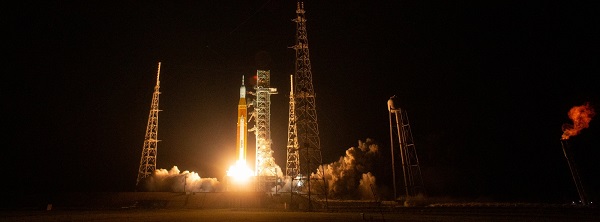Washington,(Samajweekly) NASA’s mega moon rocket has cleared all performance tests and engineers are now taking a closer look at the Space Launch System (SLS) performance to prepare for the first crewed Artemis missions.
NASA continues to evaluate data and learn more about the Space Launch System (SLS) rocket’s debut performance during the agency’s Artemis I launch on November 16 this year.
“NASA’s Space Launch System rocket has laid the foundation for the Artemis Generation and the future of spaceflight in deep space,” said John Honeycutt, SLS Programme manager.
“There is engineering and an art to successfully building and launching a rocket, and the analysis on the SLS rocket’s inaugural flight puts NASA and its partners in a good position to power missions for Artemis II and beyond,” he said.
The preliminary post-flight data indicated that all SLS systems performed exceptionally and that the designs are ready to support a crewed flight on Artemis II.
The core stage of NASA’s Space Launch System (SLS) rocket has more than 1,000 sensors and 45 miles of cabling.
The Artemis I flight test was the only way to gather real data on how the rocket performed during events like booster separation.
“The data we got back from Artemis I is critical in building confidence in this rocket to send humanity back to the Moon,” said John Blevins, SLS chief engineer.
The SLS team will use what we learn from this flight test to improve future flights of the rocket, and we are already taking what we’ve learned about operations and assembly and applying it to streamline future missions, he added.
Cameras and sensors also allowed teams to monitor how the rocket performed during its in-space manoeuvres.
Engineers also monitored the extreme temperatures and sounds the rocket experienced just after liftoff.
Througha-Artemis, NASA will land the first woman and the first person of colour on the surface of the Moon, paving the way for a long-term lunar presence and serving as a stepping stone for astronauts on the way to Mars.










